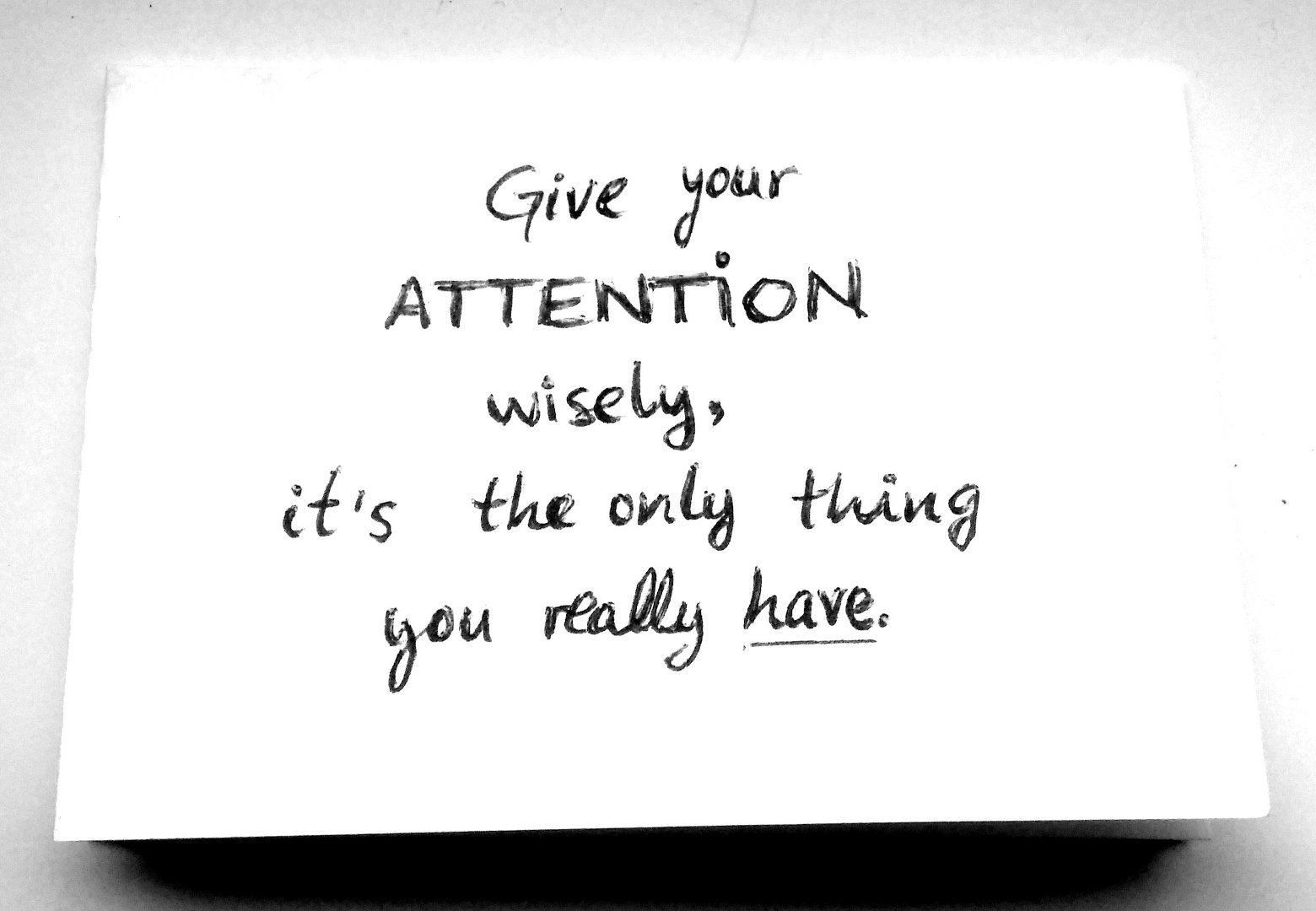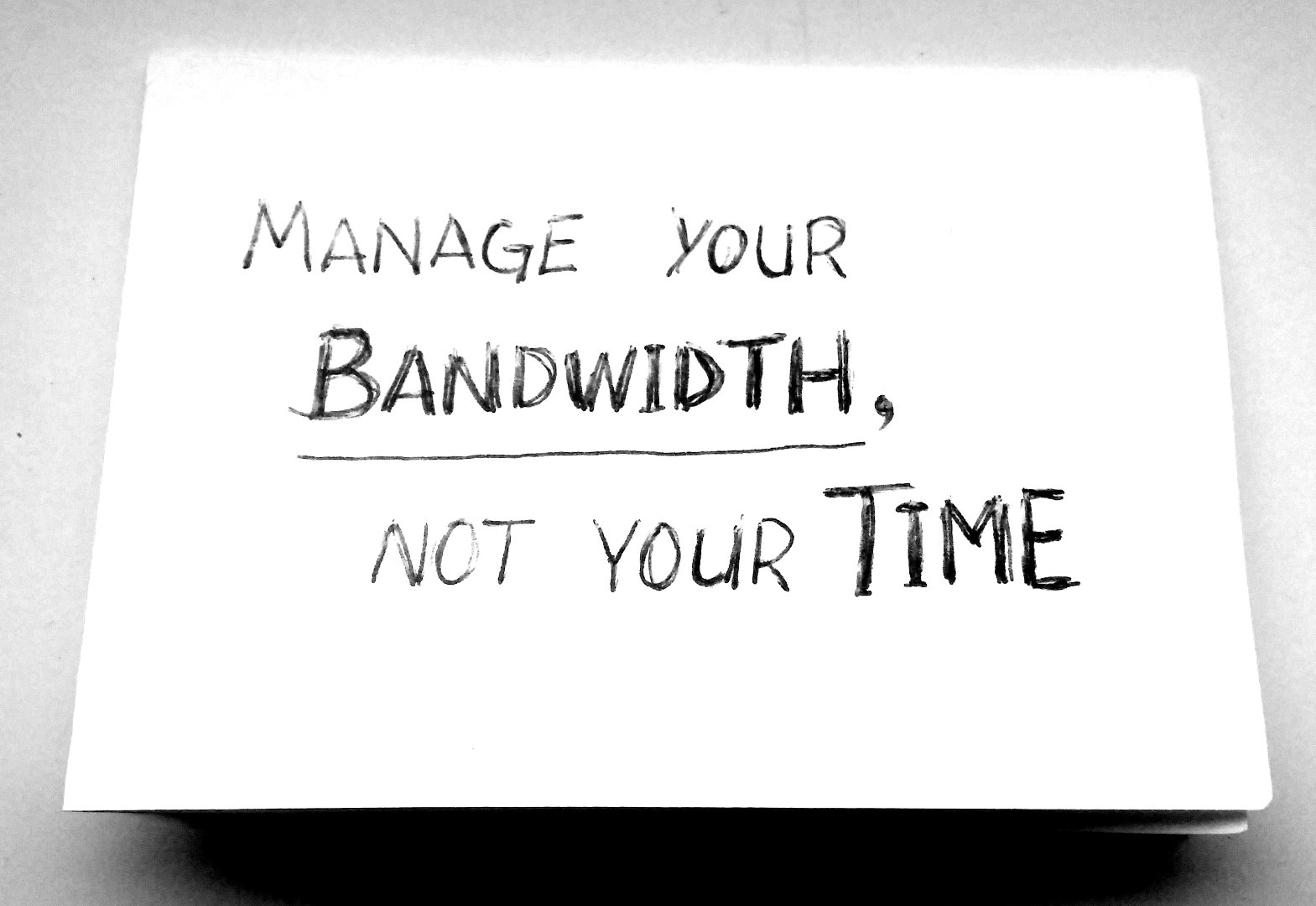POSTS
Monday Mantra #4: On attention
by Luis P. Prieto, - 7 minutes read - 1320 wordsThe ability to pay attention is one of the most important assets of a PhD student (or researcher) and plays a crucial role on our focus and productivity, but also on our creativity and wellbeing. In this month’s “Monday Mantra”, I give you not one, but two sentences that you can use to remind yourself to manage this resource wisely. Choose your favorite!
The other day I was waiting in the line for lunch, at one of the campus cafeterias. Instinctively, I reached out to my pocket to grab the phone and check my email. Halfway through that motion, I caught myself doing it. Wait, why do I want to check the email? I just checked it five minutes ago! Then, I looked around me and I saw most of the people in the line doing the same, face down, hand in front of their faces… sounds familiar?
Many small episodes like this one, have put the issue of attention on my mind lately: seeing people doing their email while doctoral students were presenting their work to get feedback (I was guilty of that myself!); a colleague telling me how wonderful it was to go for a walk in the forest… once she removed her headphones and listened to the sounds of nature; reading this article on the relationship between creativity and distraction; etc. As I become more and more aware of the role of attention in so many of the activities we consider important, I thought it would be great to share a couple of “Monday Mantras”1 to see if they help you as well.
The gift of attention
I don’t remember where I found this sentence for the first time. Probably I’m butchering some kind of Zen or motivational guru quote, but there is something striking about it – maybe this idea of attention as a gift.
Some people say that “time is the ultimate luxury” or “the ultimate currency”. And it is true. Time is all we have. You can make more money, but you cannot make more time. And still, we are “killing time” every day, we somehow give it away (to Facebook and the other tech giants that transform our engagement into money via advertising) every time we have to wait in a queue, or commute, or just walk around. We are, in a very real sense, “paying with our attention”… even if we are not sure of what we are getting in return for the payment.
For me, the mantra above is a reminder that, maybe even more than time, attention is something precious. Our cognitive capacity for attention is limited: out of the 24 hours on a day, there is only a handful of hours where you can really be attentive, focused. There is an old Spanish saying, “time is gold” (el tiempo es oro). Well, then think of attention as a gem, a jewel, something even more valuable than gold, which we can gift to people (our friends and families, a colleague in need of feedback, etc.), or to problems that are important for us and we want to solve. Give your attention wisely.
You only have so many of those gems.
Manage your bandwidth
This other mantra says pretty much the same thing, but in a more “managerial style”. It seems to come from this article by Sendhil Mullainathan (whose book I also mentioned in the last post on time scarcity). Basically, the idea is that our capacity for attention and thinking things through is limited, varies over time (e.g., in the mornings vs. after a heavy lunch), and gets occupied or depleted by things in our life: from meetings or difficult decisions… to any problem we have in our lives (e.g., being a good parent when your kids are being irritating, or not having enough money to make ends meet at the end of the month). However, we seldom think that the small things we do (like reading my email in the cafeteria queue) also consume our attention. Am I really expecting an important life-or-death email when I reach for my phone? most often, the answer is no.
It turns out that these down times, doing really nothing (vs. occupying our minds scrolling through feeds) is also strongly related with creativity and creative problem solving. People that have some time to mind-wander doing easy tasks are better able to solve difficult problems that require creative thinking later on2. The constant availability of distractions (in our computers, in our phones) is obliterating the amount of brain idleness (and, why not, boredom) that we experience on a daily basis. How might this be affecting our ability to think and solve problems creatively?
So, if you want to manage your attention and bandwidth better, and exploit mind-wandering to be more creative, here are a few tips gleaned from the articles above:
- Assign tasks in your calendar being mindful of your bandwidth and how it varies throughout the day. For me, the best times are the mornings, so I try to do my creative work then (writing, designing studies, preparing teaching), guarding it from other tasks like meetings or email.
- Similarly, be self-aware of your current levels of bandwidth: if you are tired after a day full of meetings, or you are preoccupied by some personal problem, be extra-careful when interacting with others (maybe this is not the time to discuss some tense pain-point with your spouse), and avoid taking important decisions until you have the bandwidth to think about them clearly.
- To create a bit of idle time (and hopefully boost your creativity later), just go for a long walk3 without your smarphone (gasp!). Parks and nature are great places to go, if you have them nearby.
- In general, try to alternate between focused activities and idle or less cognitively-demanding tasks. Maybe dusting your furniture, or playing with your dog… not doing email or Facebook-scrolling: they require much more attention than you think!
All work and no play…
Maybe just one last idea before I wrap-up: so far I have talked a lot about how attention and bandwidth and idle time are important… for your productivity. But not everything in life is about being productive (I am often guilty myself of thinking like this). And there is a certain danger in focusing on productivity all the time.
Make some space in your life for fun and games and idleness… because they are fun!
Try it next time you are in a queue. Instead of reaching for the phone, do nothing special. Nothing. Don’t expect anything to happen (it often doesn’t). Yet, in my experience, strange ideas (a cool present you could gift your auntie for her birthday; a new data analysis to try on your latest experiment) sometimes do appear in these increasingly scarce moments of really doing nothing.
What about you? Do you have any tricks or routines to manage your attention? Have you tried to spend more time idle but undistracted and, if yes, have you noticed any effects? Let us know in the comments below!
-
If you don’t know what “Monday Mantras” are or how to use them, please read the original post I wrote about them. I’ll wait here, don’t worry. Done? Nice, let’s continue… ↩︎
-
Mind-wandering seems to be something of a double-edged sword: doing a lot of it has been related with things like depression (e.g., if your mind wanders to ruminating on problems or unhelpful self-talk), but a little of it apparently aids creativity. For a larger discussion on this, see Smallwood, J., & Schooler, J. W. (2015). The science of mind wandering: Empirically navigating the stream of consciousness. Annual Review of Psychology, 66, 487–518. ↩︎
-
Oppezzo, M., & Schwartz, D. L. (2014). Give your ideas some legs: The positive effect of walking on creative thinking. Journal of Experimental Psychology: Learning, Memory, and Cognition, 40(4), 1142. ↩︎

Luis P. Prieto
Luis P. is a Ramón y Cajal research fellow at the University of Valladolid (Spain), investigating learning technologies, especially learning analytics. He is also an avid learner about doctoral education and supervision, and he's the main author at the A Happy PhD blog.

